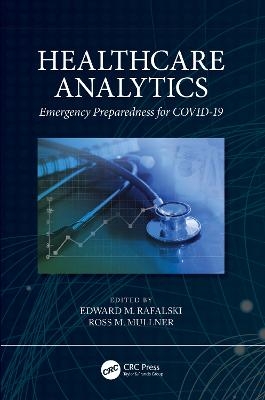
Healthcare Analytics
CRC Press (Verlag)
978-1-032-06845-9 (ISBN)
The first COVID-19 case in the US was reported on January 20, 2020. As the first cases were being reported in the US, Washington State became a reliable source not just for hospital bed demand based on incidence and community spread but also for modeling the impact of skilled nursing facilities and assisted living facilities on hospital bed demand. Various hospital bed demand modeling efforts began in earnest across the United States in university settings, private consulting and health systems. Nationally, the University of Washington Institute of Health Metrics and Evaluation seemed to gain a footing and was adopted as a source for many states for its ability to predict the epidemiological curve by state, including the peak.
This book therefore addresses a compelling need for documenting what has been learned by the academic and professional healthcare communities in healthcare analytics and disaster preparedness to this point in the pandemic. What is clear, at least from the US perspective, is that the healthcare system was unprepared and uncoordinated from an analytics perspective. Learning from this experience will only better prepare all healthcare systems and leaders for future crisis.
Both prospectively, from a modeling perspective and retrospectively from a root cause analysis perspective, analytics provide clarity and help explain causation and data relationships. A more structured approach to teaching healthcare analytics to students, using the pandemic and the rich dataset that has been developed, provides a ready-made case study from which to learn and inform disaster planning and preparedness. The pandemic has strained the healthcare and public health systems. Researchers and practitioners must learn from this crisis to better prepare our processes for future pandemics, at minimum. Finally, government officials and policy makers can use this data to decide how best to assist the healthcare and public health systems in crisis.
Edward M. Rafalski is Adjunct Assistant Professor at University of Illinois School of Public Health, and an Affiliate Associate Professor at the University of South Florida, College of Public Health. He holds qualifications from the University of Chicago and Yale University School of Public Health.
Introduction – Edward M. Rafalski
I. Section 1 – Epidemiology and analytics
1. What is a pandemic, an epidemic? – Jonathan A. McCullers
2. A brief history of pandemics – Jonathan A. McCullers
3. Health care continuum – Edward M. Rafalski
4. The fog of war and data – Edward M. Rafalski
5. Sources of data/modeling – Edward M. Rafalski and Robert Marksthaler
6. Quantifying and responding to COVID's financial and operational impact – Mark Grube and Rob Fromberg
II. Section 2 - State case studies
7. Measuring and addressing healthcare employee well-being in an Alabama health system during COVID-19 – Katherine A. Meese et al.
8. Colorado state case study - Adom Netsanet et al.
9. Case study: A Florida COVID-19 dashboard – Zachary Pruitt et al.
10. State case study: Illinois – Helen Margellos-Anast et al.
11. Tennessee case study – Cori Cohen Grant et al.
12. Regional modeling – Madeleine McDowell et al.
III. Section 3 - Topics
13. Healthcare analytics: The effects of the pandemic on behavioral health – Kasey Knopp and Naakesh (Nick) Dewan
14. Digital transformation in healthcare: How COVID-19 was an agent for rapid change – Bala Hota and Omar Lateef
15. Telehealth – Richard Fine
16. The COVID-19 pandemic and development of drugs and vaccinations – Pradeep S. B. Podila
16. Value of health information exchanges to support public health reporting – Pradeep S. B. Podila
Conclusion – Edward M. Rafalski and Ross M. Mullner
Epilogue – Edward M. Rafalski
| Erscheinungsdatum | 28.07.2022 |
|---|---|
| Zusatzinfo | 15 Tables, black and white; 14 Line drawings, black and white; 45 Halftones, black and white; 59 Illustrations, black and white |
| Verlagsort | London |
| Sprache | englisch |
| Maße | 156 x 234 mm |
| Gewicht | 571 g |
| Themenwelt | Sachbuch/Ratgeber ► Gesundheit / Leben / Psychologie |
| Mathematik / Informatik ► Informatik ► Theorie / Studium | |
| Mathematik / Informatik ► Mathematik ► Analysis | |
| Medizin / Pharmazie ► Allgemeines / Lexika | |
| Studium ► Querschnittsbereiche ► Prävention / Gesundheitsförderung | |
| Sozialwissenschaften ► Politik / Verwaltung ► Europäische / Internationale Politik | |
| ISBN-10 | 1-032-06845-0 / 1032068450 |
| ISBN-13 | 978-1-032-06845-9 / 9781032068459 |
| Zustand | Neuware |
| Informationen gemäß Produktsicherheitsverordnung (GPSR) | |
| Haben Sie eine Frage zum Produkt? |
aus dem Bereich


